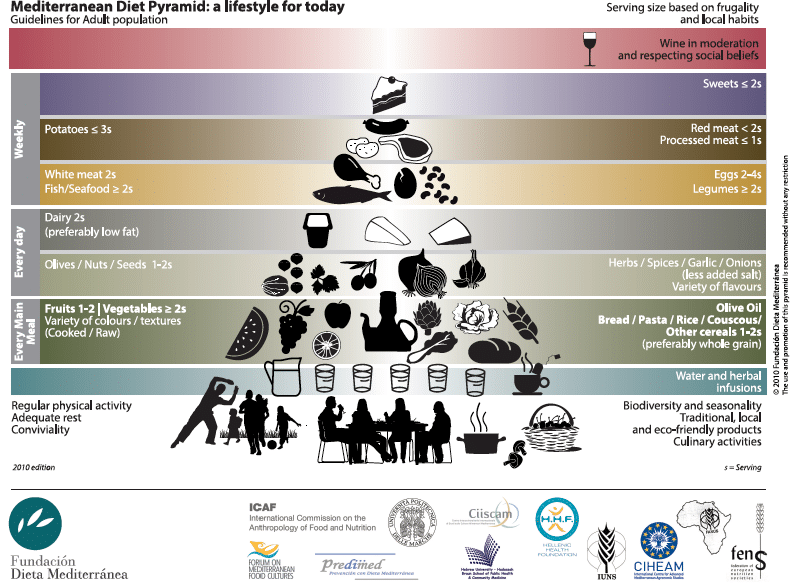A lot of people would like to live in the Mediterranean. The weather is warmer than the UK, the landscape goes from rugged, to rural to beautiful beaches and it often feels more relaxed. That relaxed, warm lifestyle also brings benefits for food.
The Med diet is well researched and known to have benefits for major health conditions. It may help prevent heart disease, stroke and type 2 diabetes, lower cholesterol and prevent metabolic syndrome. Benefits can also be seen for Alzhiemers, dementia, depression and Parkinsons.
The Mediterranean diet is not really a diet but a way of life. Regular meals are a key component with meals being an occasion for sitting down and taking time to enjoy food and company. Eating regularly and slowly is something that can help with blood sugar control, weight management and IBS.
Clinical trials have shown positive effects of this type of diet on reducing the risk of overall mortality, cardiovascular disease and also total cholesterol levels. A significant effect has been seen on cancer incidence and mortality too. The Med Diet has been shown to be more effective than a low fact diet for making long term changes in the risk factors for heart disease and inflammatory diseases.
Summary of the Diet:
Low in saturated fats
Low in salt
Low in sugar
Moderate meat and dairy intake
Moderate fish consumption
Moderate alcohol intake alongside meals
High intake of fruit, vegetables, legumes and unrefined carbohydrates
I love this diagram of the Mediterranean Diet Pyramid.

Eat More:
Fruit and Vegetables – eat a variety and a range of colours to get a mixture of antioxidants and micronutrients.
Fish – at least twice a week, at least 1 portion should be oily (tuna, salmon, mackerel, herring, trout, sardines).
Eat more beans and pulses. Try adding lentils to meat dishes, or make a vegetarian curry with beans. Falafels and hummous make great lunchtime options.
Wholegrains – for example oats, brown rice, wholemeal bread, couscous, bulghar wheat and plain popcorn.
Nuts and seeds once a day as a snack will provide healthy fats, protein, vitamin E, magnesium and are filling.
Include Olive oil.
Drink plenty of water.
References:
http://www.webmd.com/heart-disease/tc/mediterranean-diet-topic-overview
http://dietamediterranea.com/dietamed/piramide_INGLES.pdf (2010 Fundacion Dieta Mediterrainea)
http://www.ncbi.nlm.nih.gov/pubmed/20810976
http://www.ncbi.nlm.nih.gov/pubmed/21854893